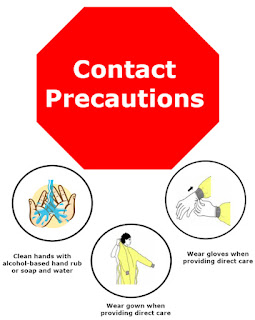I am back on the internal medicine ward service for the next 2 weeks, so will likely be blogging 'light' given the volume of patient care.
I came across an intriguing article last week titled 'Uncertainty in the application of contact precautions', in press in Clinical Infectious Diseases. The study authors distributed a voluntary, paper survey at a meet-the-professors session at the 2011 Infectious Diseases Society of America meeting in Boston.
There were a total of 34 respondents. A majority of the survey respondents used contact precautions for the care of patients colonized or infected with multi-drug resistant organisms. Only 38% of the participants believed that contact precautions , as currently practiced, prevents the transmission of drug resistant pathogens and 26% felt that they prevent the transmission of all pathogens. Last, 74% of respondents were concerned that contact precautions may cause harm. I have blogged about the adverse consequences of contact precautions before.
Of course, these 34 survey respondents are not representative of all infectious diseases specialists and hospital epidemiologists. The findings, however, highlight an important, ongoing concern, specifically that a knowledge gap exists on how to best apply contact precautions in different settings so as to maximize benefit while minimizing harm.
I came across an intriguing article last week titled 'Uncertainty in the application of contact precautions', in press in Clinical Infectious Diseases. The study authors distributed a voluntary, paper survey at a meet-the-professors session at the 2011 Infectious Diseases Society of America meeting in Boston.
There were a total of 34 respondents. A majority of the survey respondents used contact precautions for the care of patients colonized or infected with multi-drug resistant organisms. Only 38% of the participants believed that contact precautions , as currently practiced, prevents the transmission of drug resistant pathogens and 26% felt that they prevent the transmission of all pathogens. Last, 74% of respondents were concerned that contact precautions may cause harm. I have blogged about the adverse consequences of contact precautions before.
Of course, these 34 survey respondents are not representative of all infectious diseases specialists and hospital epidemiologists. The findings, however, highlight an important, ongoing concern, specifically that a knowledge gap exists on how to best apply contact precautions in different settings so as to maximize benefit while minimizing harm.
